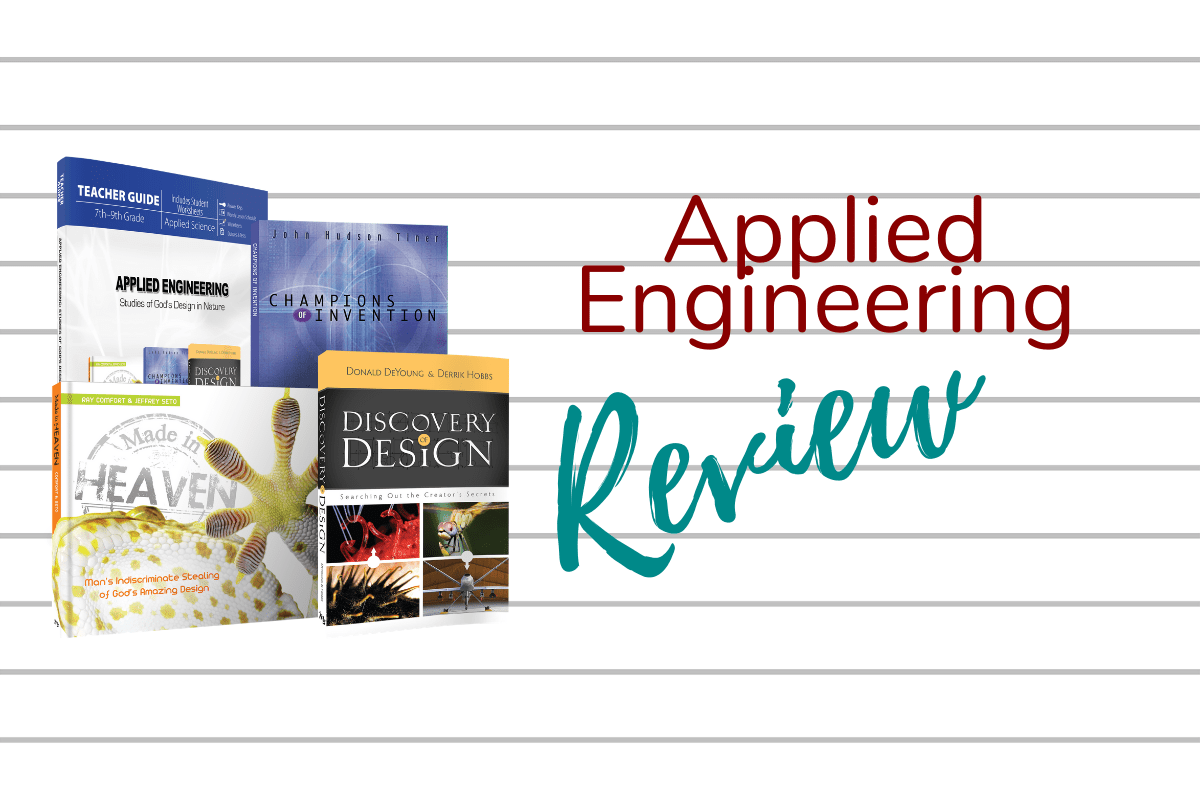
When in your homeschool do you teach engineering, anyway? How about junior high? With the right curriculum and engaging material, young students can build an appreciation of God’s creation and it’s application to modern design.
Applied Engineering:
Studies of God’s Design in Nature
 MasterBooks provides a unique curriculum for junior high science. This simple course offers a wealth of information students will enjoy.
MasterBooks provides a unique curriculum for junior high science. This simple course offers a wealth of information students will enjoy.
The complete curriculum comes in four books: a consumable Parent Lesson Planner, Discovery of Design, Made in Heaven, and Champions of Invention.
The Parent Lesson Planner is the heart of the course. It begins with a brief instruction on how to use the full-year program. Next follows the planner, which gives daily assignments with a box for the student to check completion and a place for grades.
 The bulk of the Parent Lesson Planner, however, is actually a consumable student workbook. Each lesson includes 5-10 brief questions on the day’s reading. The questions are straightforward, and even my writing-adverse student had no problem completing each assignment quickly.
The bulk of the Parent Lesson Planner, however, is actually a consumable student workbook. Each lesson includes 5-10 brief questions on the day’s reading. The questions are straightforward, and even my writing-adverse student had no problem completing each assignment quickly.
After the worksheets come the quizzes and tests, which are perforated for easy removal if desired. Finally are the answers to the worksheets and tests. My only complaint about the entire course was that these answers were too complete, usually a paragraph long. More concise answers in the key would have made grading a lot faster.
 Discovery of Design by Donald DeYoung and Derrik Hobbs is the thickest and most imposing of the books. My student was not excited about reading it at first glance. But once he started the course, he grew to love it. Each lesson includes two short pages to read on one interesting topic. It presents a scientific fact and examples from creation or an example of an animal that inspired the design of something commonplace.
Discovery of Design by Donald DeYoung and Derrik Hobbs is the thickest and most imposing of the books. My student was not excited about reading it at first glance. But once he started the course, he grew to love it. Each lesson includes two short pages to read on one interesting topic. It presents a scientific fact and examples from creation or an example of an animal that inspired the design of something commonplace.
Made in Heaven by Ray Comfort and Jeffrey Seto looks, at first glance, like a picture book. My student found the layout and illustrations inviting. Every two-page reading assignment presents more examples of man’s design based on God’s design. The detailed illustrations and charts help students completely understand the correlation.

Champions of Invention by John Hudson Tiner resembles a thick pamphlet, yet it represents the heaviest reading of the course. The book presents nine short (6-8 page) biographies of scientists. Students read the book a chapter each week in the last quarter of the year and write a brief report on one scientist.
My student loved this course; it was his favorite subject of the year, if not his homeschooling thus far. He looked forward to each day’s assignments. Though he only briefly answered each worksheet question and hardly ever studied for a test or quiz, he scored nearly 100% recall on each of them. I was shocked by the seemingly trivial facts he remembered. He said it was just so interesting it stuck in his mind.

That is the beauty of this course. Finally, students can enjoy science and remember the content simply because they love it. Instead of groaning through a thick text or difficult assignments or grade-crushing tests, they can quickly breeze through a subject and move on to observing what they learned in real life.
In short, Applied Engineering makes true scientists out of homeschool students.
Applied Engineering: Studies of God’s Design in Nature includes a consumable workbook and three non-consumable texts. You can preview each book on the publisher’s website. Though advertised for seventh through ninth grade, the course is more appropriate for junior high than high school study. The economical course is available directly from the publisher for $60.96 (currently on sale for $45.11) or from Amazon. Each book is also available as downloads from the publisher.
Disclosure: I received a copy of this curriculum from the publisher for my own consideration. These opinions are my own. Affiliate links help support this site.


You may have mentioned this but does this curriculum have labs to qualify for high school credit?
It does have labs in the second semester, but overall this curriculum is best for middle school
Can you recommend any videos or experiments to add to this course for a hands-on, 8th grade boy?
My son looked up YouTube videos for particular concepts he was studying. He found that fun and interesting.
That’s a great question. I would look up experiments on YouTube and replicate them. I feel like the later MasterBooks courses do have many experiments, so I guess the lack of them in this course did not bother me.